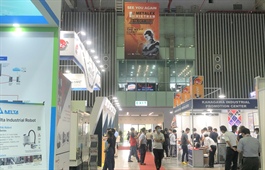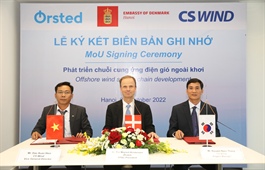Vietnam ready to become a semiconductor manufacturer
Vietnam ready to become a semiconductor manufacturer
RMIT University academics weigh in on Vietnam’s potential to grow into a semiconductor chip manufacturing powerhouse.
Vietnam’s semiconductor industry has witnessed a surge in foreign interest when Vietnamese telecommunications giant Viettel recently announced it would become a semiconductor producer amidst the global chip shortage.
This interest ranges from intentions to train engineers in chip design to investments in manufacturing facilities for semiconductor components and materials.
RMIT lecturers Majo George and Nguyen Manh Hung from the School of Business & Management and Nguyen Le Huy from the School of Science, Engineering & Technology shared: What lies behind these developments?
|
Majo George, Nguyen Manh Hung and Nguyen Le Huy (From left to right). Photo: RMIT |
Majo George: “Right decision at the right time”
As a result of Covid-19, there has been a severe chip shortage globally. The pandemic has affected production by the “Big 4” semiconductor players in the Asia Pacific – Taiwan, China, Japan, and South Korea. The work-from-home trend increased the sales of laptops, home entertainment systems and game consoles, which raised the need for chips and tipped the demand-supply balance.
The decision to produce chips in Vietnam comes at the right time, as the world is experiencing a chip shortage and Vietnam is undergoing a digital transformation that includes the transition to digital governance, digital economy and digital society.
Venturing into chip manufacturing will allow Vietnam to self-develop or acquire cutting-edge technological expertise. This might be a challenge, but the move will boost Vietnam's future aspiration to become the prominent manufacturing hub in the region.
Local industries would be able to source locally manufactured chips. And Vietnam's chip output could help alleviate the global and regional shortages.
Quality assurance for Vietnam-made chips should be a priority, as are periodic research and product updates. Employing highly skilled and experienced researchers and specialists will be a challenge. Here, Vietnam must increase training and development of local skills. This can be accomplished by collaborating with prestigious universities and research institutes.
Nguyen Manh Hung: “Building a steady supply chain”
Producing chips in Vietnam is in line with the “Make in Vietnam” orientation. Almost all aspects of modern society require semiconductors. If Vietnam succeeds in the semiconductor industry, it can join the supply chain of high-tech products such as communication equipment, computers, medical equipment and military hardware.
However, building a competitive semiconductor industry requires more than just capital investment. It will be a challenge to access the right technologies and establish a supply chain that can ensure consistent supply and consumption.
The semiconductor chip production process consists of three main stages: design, manufacturing and assembly, and testing and packaging (ATP). Stages 1 and 2 are high-value, high-tech processes associated with intense research and development (R&D) activity, specialized software for design, and specific production equipment. Stage 3 is the one that requires the highest labor content and the lowest barriers.
Entering the third stage seems to be the easiest for Vietnam. However, the main objective of Vietnam's entry into this competitive market should probably be to strengthen its chip design capability and move towards producing high-end semiconductor components.
Nguyen Le Huy: “Devising medium and long-term strategies”
The global semiconductor chip industry is expected to grow 10% in 2022 to over US$600 billion for the first time and become a trillion-dollar industry by 2030.
Joining the global R&D, design, production, and distribution of semiconductor chips will bring enormous economic advantages to Vietnam. Given the country’s position and capabilities, medium- and long-term strategies are needed to develop the local semiconductor industry.
In the medium term, Vietnam needs to participate in R&D stages that rely heavily on the human factor. The government needs to continue to invest and offer preferential policies to attract large corporations such as Samsung, Intel, Synopsys and Cadence to establish or expand their semiconductor R&D centers in Vietnam. At the same time, it is necessary to have policies to support universities in training high-quality graduates in the field of semiconductors.
In the long term, Vietnam must reach cooperation agreements to support technology transfer from semiconductor leaders such as the US, Japan, and South Korea. From there, Vietnam can progress towards complete autonomy in all the important stages of semiconductor production.
At RMIT University Vietnam, semiconductor-based design and app development courses are taught in several engineering programs. Students can learn and practice semiconductor chip design software from leading corporations such as Mentor Graphics and Synopsys, as well as complete capstone projects or internships with leading industry partners such as Intel, Faraday, and Renesas.
In addition, we are currently assessing the feasibility of introducing a specialized engineering program focusing on semiconductors. We desire to collaborate extensively with local universities and big global corporations to contribute to developing the semiconductor field in Vietnam.

























